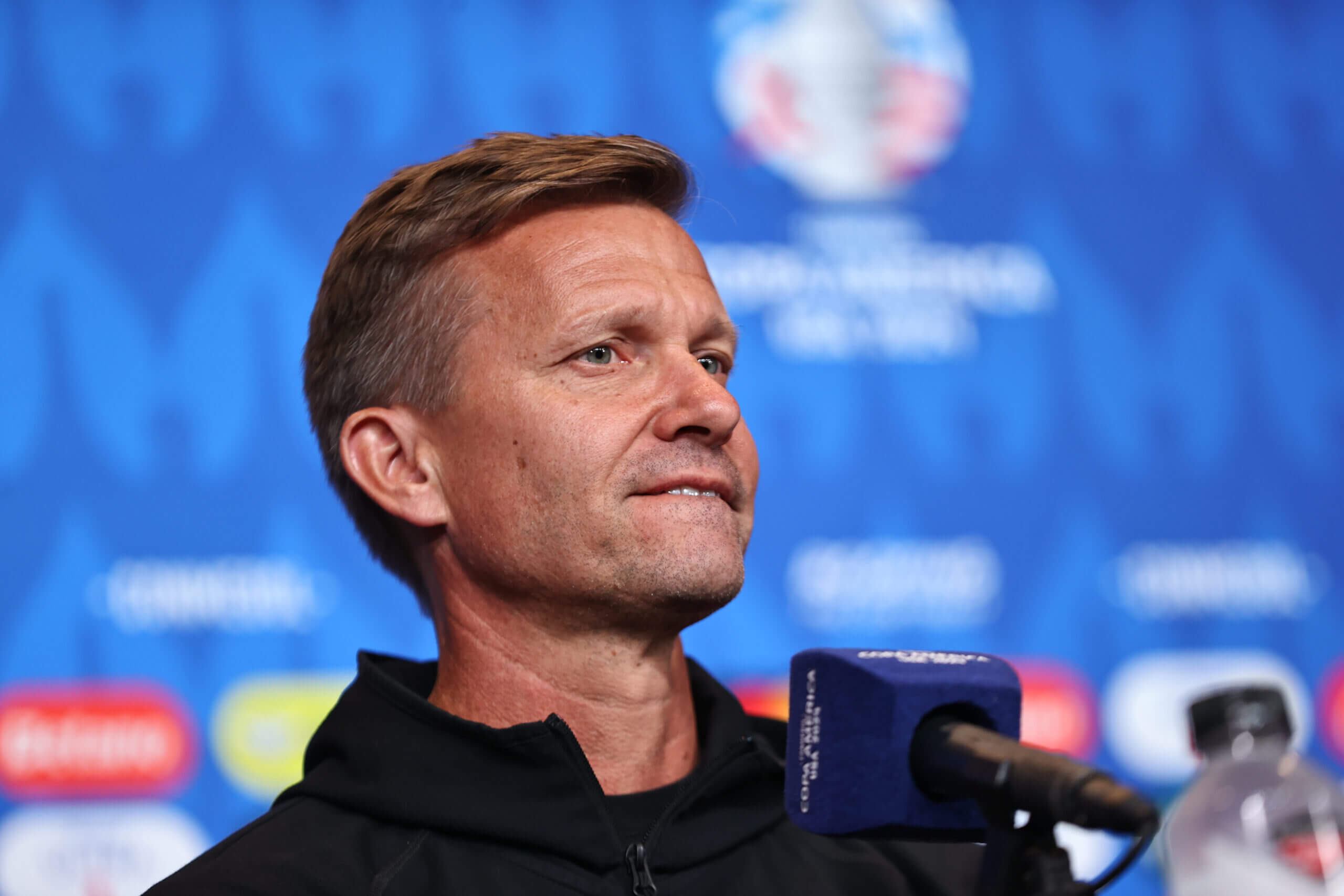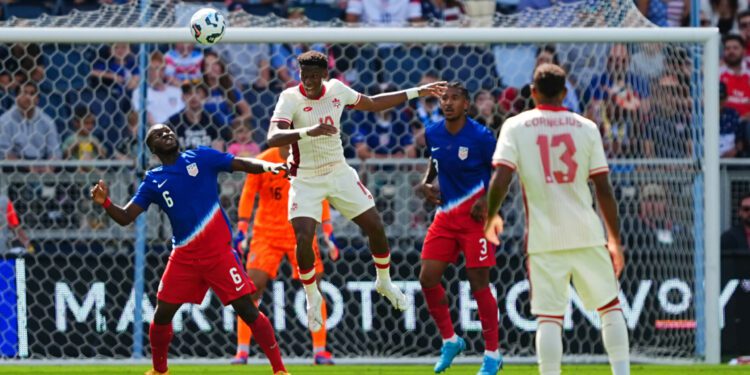GO DEEPER
USMNT 1 Canada 2 takeaways – Pochettino arrival can’t come soon enough
With Canada’s dominance against a lacklustre U.S. side, they have reason to believe results like this should not be a surprise. And they should have reason to believe their impressive fourth-place finish in Copa America — the best performance from a CONCACAF team — was no fluke.
Teams can build momentum in tournaments and ride that momentum to unexpected results. It was worth wondering if Canada’s Copa America performance was the product of the momentum from a new manager — and letdowns can often follow momentum.
Canada’s performance against the USMNT shows that letdown is yet to occur and, under Marsch, Canada look the best team in CONCACAF as the USMNT and Mexico stumble to find their way.
“This win is massive for us,” Alphonso Davies said to The Athletic after the match. When asked if they were the best team in the region, Davies said: “We’re working there. Do we think we’re the best team? No, because all the guys are humble and we know there’s a lot of work to put in.”
Still, in the build-up to this game, it was hard not to sense the newfound braggadocio from Marsch and his team, especially considering the adjacent storyline: the American-born Marsch previously interviewed for the job of United States coach in 2023. Marsch correctly predicted the 2-1 scoreline days before kick-off and that kind of attitude can come back to haunt a coach and a team. But it did not. Canada were the better team and they were more physically assertive, winning duels and adhering to a forward-thinking mindset.
“Kicked that 67-year curse, eh,” a Canada Soccer official, speaking anonymously to protect relationships, said declaratively, but not necessarily proudly, as he left the team’s locker room.
Canada won in the United States for the first time since 1957, but the way they pressed the host’s defence, swarmed the middle of the park and transitioned with pointed energy with chance after chance, it does not feel like this will be Canada’s last win in the United States for another two generations.
Instead, with the 2026 World Cup approaching and the three host nations put under a microscope, Canada should no longer feel happy to just be invited to the dance.
Canada’s confidence is seemingly boundless right now.

Canada have been transformed under Marsch (Omar Vega/Getty Images)
“I’d much rather coach Canada than the U.S. right now,” Marsch said to reporters after the victory. “You can see the mentality that’s been developed. You can see the way this team plays. You can see how much they love playing for the national team and they’re willing to put their careers and lives and the way they play on the line to be the best they can be for each other and for the team.”
We’re seeing this Canadian team go all in on Marsch’s demands for high-intensity pressing. That’s not an easy feat to pull off considering players are coming from different systems with their clubs and high-pressing soccer is often rare to see at the international level.
“Every practice for Canada is so intense,” Jacob Shaffelburg, the scorer of Canada’s first goal, told reporters after the game. “It catches me off guard every single time I come into camp. You’re dead after an hour of practice.”
Canada do not just look like a team transformed under Marsch; they look capable of continuing to elevate their play against the teams they need to beat.
“Everyone’s bought in, big time,” Shaffelburg said. “It’s fun to play, having that trust from your brothers that they’re going to be there when you press.”
There is context to this USMNT performance. They were missing six key players, including Weston McKennie, Tyler Adams and Gio Reyna. But the plodding, effortless performance seems deep-seated and not something a few players could remedy.
Canada was missing Ismael Kone and Tajon Buchanan, two of their most potent players and guaranteed starters, too. Yet Canada’s player pool is continuing to evolve.
Marsch has wanted players to elevate their game. No one is doubting Davies, Jonathan David and Stephen Eustaquio will be starters in 2026, but Marsch wants to determine the secondary crop of players he can rely upon and some of the best performers against the U.S. were players considered on the fringes of the squad.

GO DEEPER
How Jesse Marsch looked to emulate the USMNT to coax more swagger from Canada
Shaffelburg, a winger essentially cast aside by Toronto FC in 2022, continues his ascent, scoring his fourth goal in 17 Canada appearances.
Mathieu Choiniere stepped in for Kone in central midfield and covered plenty of ground, looking resolute physically and making smart plays. “Really outstanding,” Marsch said of Choiniere.
Ali Ahmed, in his eighth appearance, buzzed with the energy and decisive defensive action that could make him a lock for a starting role. “Fantastic,” Marsch, speaking in the post-match press conference, said of Ahmed. “But I’ve been watching him play with his club and he’s elevated his performances a lot.”
When Marsch took over in May, he was quietly concerned about the strength of his bench, but he should now feel more confident about going deeper into his squad. Contrast that with the U.S. team: against Canada, did it really look like any of those players wanted the win? The difference in effort levels was staggering.
“The adaptation to be the team I want them to be tactically and mentality-wise, it’s been a real pleasure to coach them,” Marsch said. “That’s what I think you see today, the discipline, the organization, the aggressiveness, the understanding of what we want the game to look like.”
The new-coach bump in results is one thing, but Marsch has heightened physical and tactical demands. This young Canadian team is rising to his challenges, which suggests more positive results could be ahead. Wins over the United States should no longer be considered surprising.
(Top photo: Kyle Rivas/USSF/Getty Images for USSF)
Source link : http://www.bing.com/news/apiclick.aspx?ref=FexRss&aid=&tid=66de0b53d2c540c4bc9d6b4ff2c72990&url=https%3A%2F%2Fwww.nytimes.com%2Fathletic%2F5752545%2F2024%2F09%2F08%2Fcanada-usmnt-concacaf-kansas%2F&c=3624057643707070464&mkt=en-us
Author :
Publish date : 2024-09-08 01:20:00
Copyright for syndicated content belongs to the linked Source.












